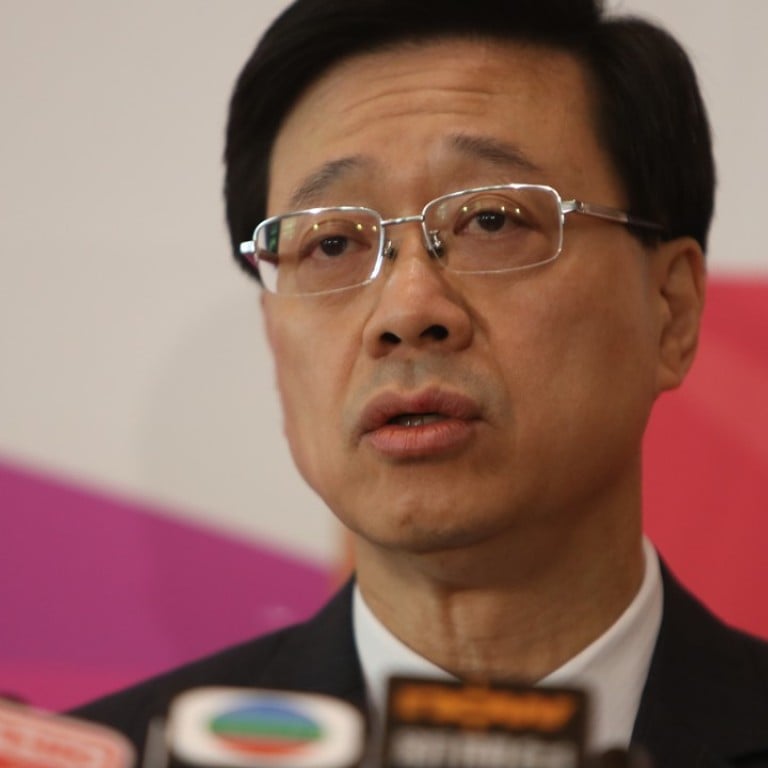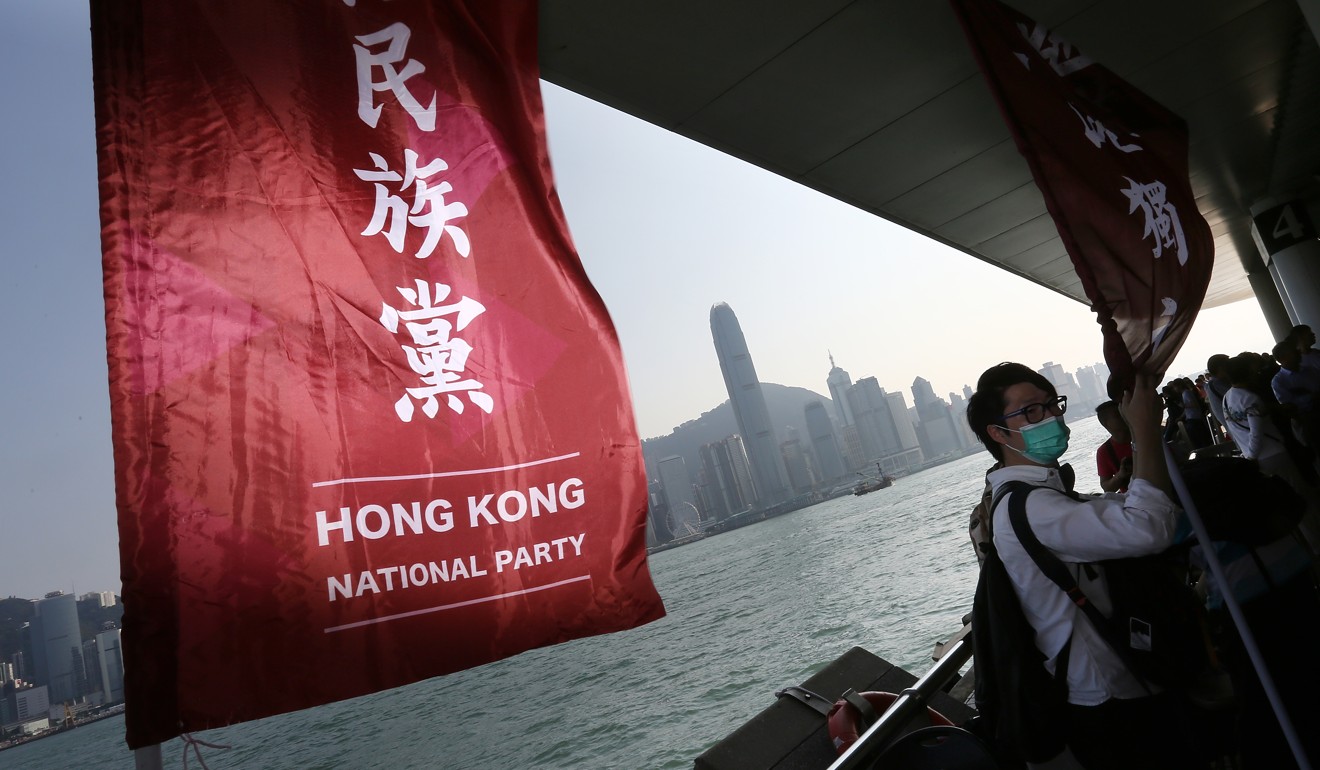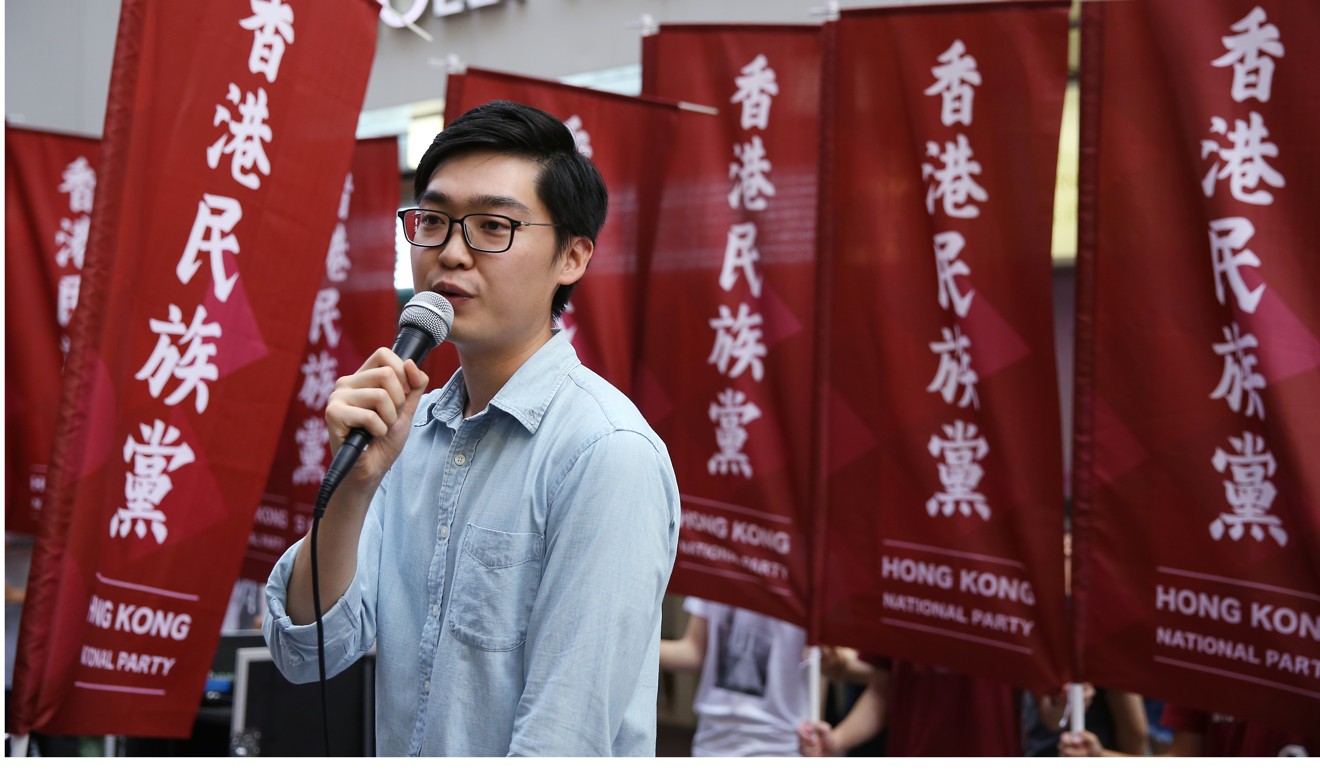
Hong Kong separatist political party given 21-day ultimatum to contest unprecedented ban
Move is the strongest and most controversial to date by the city’s government to decisively crush pro-independence sentiment
Hong Kong police are for the first time seeking to ban a separatist party in the name of protecting national security – the strongest and most controversial effort to date by the authorities to decisively crush an already marginalised pro-independence movement in the city.
On Tuesday, Secretary for Security John Lee Ka-chiu gave the Hong Kong National Party an ultimatum to submit its case within three weeks as to why he should not act on the police recommendation.
“I am giving 21 days to the Hong Kong National Party to give me written representations as to why they think that I should not give that order,” he said. “So I will not make a decision before the expiry of the 21 days.”

Lee pointed out that if the party was banned, it could still appeal to Chief Executive Carrie Lam Cheng Yuet-ngor, who could make a final decision in consultation with her cabinet, the Executive Council.
While opposition politicians and some legal experts were quick to condemn the authorities for “political oppression”, and warn it was effectively “giving life” to already sidelined independence advocacy, Lam rejected their concerns that the “one country, two systems” policy was under attack.
“They [Beijing leaders] absolutely have no intention to undermine the Hong Kong system,” she said. “But of course, one country does mean you have to respect national sovereignty and national interest. So, if this so-called red line or bottom line is breached, then the government, and myself as chief executive, will have to make it very clear that is not tolerated.”
Lee insisted the government had always been clear about its stance against independence advocacy, toeing the “red line” drawn by Beijing.
Hong Kong localist mounts legal challenge after being barred from Legco polls
“I am not discussing the Hong Kong National Party’s case, but … the nation has clearly stated that any act to destroy the country’s sovereignty and territorial integrity, or to separate the country, [crosses] an untouchable red line,” the security minister said, citing remarks by President Xi Jinping in Hong Kong last year.
The ban would be enforced by invoking the law known as the Societies Ordinance against a political party for the first time in the city’s history.
Lee insisted it was in line with local and international human rights laws, and would not compromise the city’s much-valued pillars such as civil liberties and freedom of association.
“Yes, in Hong Kong, we have freedom of association, but that right is not without restrictions,” Lee said. “According to the Hong Kong Bill of Rights Ordinance, restrictions can be made by law if it is necessary in the interests of national security or public safety, public order, the protection of public health and morals, or the protection of the rights and freedom of others.”

The security minister would not comment on whether this was the start of a crackdown on other organisations advocating the separation of the city from China, only saying: “One principle is important, that any person or any society in Hong Kong must act within the law.
“Anything we do must be in accordance with the laws of Hong Kong. If the law of Hong Kong says under some circumstances, we have a legal responsibility to take action, then we must act in accordance with the law.”
The Hong Kong National Party was launched in March 2016, riding on a rising tide of localist groups supporting controversial ideas ranging from self-determination to independence for the city, just over a year after the end of the 79-day Occupy protests in late 2014 calling for greater democracy. The party’s goal is to achieve “a self-reliant nation, an independent Hong Kong”.
Party co-founder Andy Chan Ho-tin, 27, was banned by electoral officers from contesting the 2016 polls for seats in the legislature because of his pro-independence stance.
“It is definitely another attempt to oppress pro-independence forces in Hong Kong,” Chan said.
He told the Post police officers had delivered documents to him on Tuesday morning, stating the force’s assistant societies officer had recommended to the secretary for security that the party be banned under Section 8 of the Societies Ordinance.
The post of societies officer is held by the city’s police commissioner, while the assistant officers are usually senior brass.
Section 8 allows for the security minister to prohibit a “society” from operating if he reasonably believes it is warranted.
Lee explained that while the National Party had not officially registered with the government as a society under the relevant ordinance, any group with more than one member was regarded by law enforcement agencies as a society.

A ban would make it a criminal offence to profess or claim to be an office bearer for the party, to act as a member, to attend a meeting, or to pay money or aid to the organisation, Lee added. Offenders could face up to three years in prison.
The minister said the proposed ban was not related to national security legislation the Hong Kong government was duty-bound to enact under Article 23 of its mini-constitution, to make any act of treason, secession, sedition or subversion against the central government a criminal offence.
The vice-chairman of the city’s biggest pro-establishment party voiced support for the police force’s recommendation.
“Freedom of speech and association does not include the freedom to advocate Hong Kong independence,” said Gary Chan Hak-kan of the Democratic Alliance for the Betterment and Progress of Hong Kong.
Hong Kong election officials can block candidates based on political views but must ensure clear evidence, court rules
But opposition pan-democrat lawmaker Charles Mok said the move was “absolutely political suppression”, while Council Front legislator Eddie Chu Hoi-dick raised fears that the authorities were aiming beyond the Hong Kong National Party to stifle dissent.
“If we accept this, the next step will be eradicating all groups in Hong Kong that do not accept the rule of the Chinese Communist Party, or which call for an end to one-party dictatorship [in China],” Chu said.
The term “national security” is defined in the Societies Ordinance as “the safeguarding of the territorial integrity and the independence of the People’s Republic of China”, but some human rights law experts see it as too vague and open to abuse.
Law Yuk-kai, director of Human Rights Monitor, said the government was abusing the law by adopting “the lowest threshold” of national security to strip Hongkongers of their rights.
“By international standards, the authorities can only deprive people of their freedoms and rights if it has been proven that they have endangered the existence of the state, or that they have adopted violent means to threaten the state,” he said. “I do not see how the Hong Kong National Party is related to this.”
Speaking in a personal capacity, Bar Association vice-chairman Robert Pang Yiu-hung said it was “debatable” whether the party’s activities, such as handing out leaflets and giving public speeches, justified the crackdown.
Ousted young lawmakers Nathan Law Kwun-chung, former chairman of Demosisto, and Sixtus Baggio Leung Chung-hang, who co-founded Youngspiration, expected their parties to be next on the chopping block, for advocating self-determination.
The Civil Human Rights Front said it would organise a protest march on Saturday against the proposed ban, complaining it had dealt a huge blow to the city’s freedoms.
Additional reporting by Kimmy Chung and Sum Lok-kei


